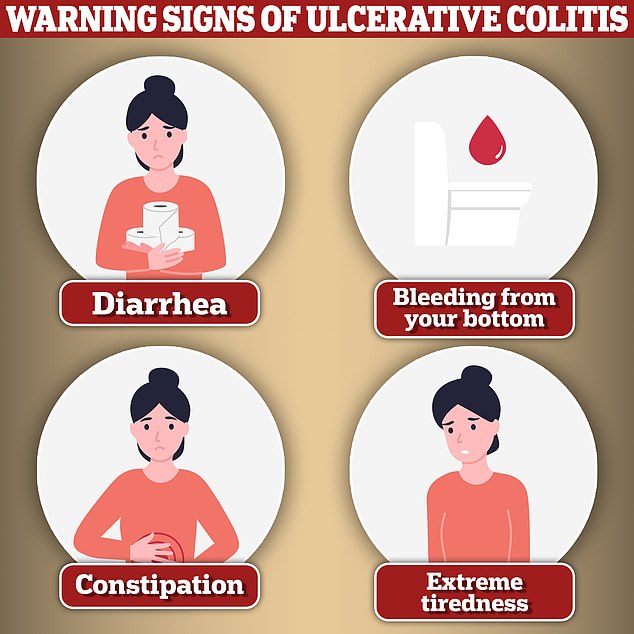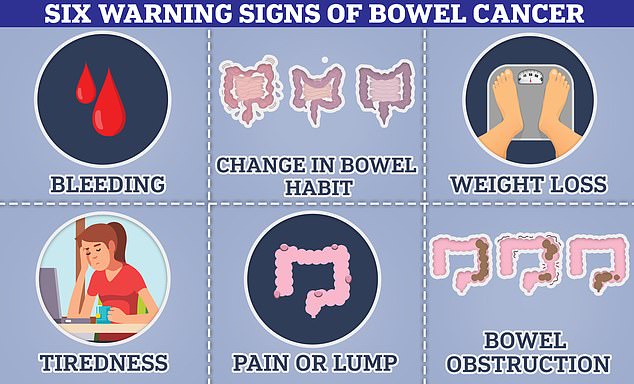In a video posted to Instagram, Dr Sood who was not involved in the study explained:
Coconut water might do more than quench your thirst—it could help ward off a disease that increases the risk of cancer, a study has found.
Experts believe that the tangy drink has the potential to keep the symptoms of ulcerative colitis—a chronic inflammatory bowel disease which can lead to bowel cancer—under control.
Speaking of the findings on Instagram, Dr Kunal Sood, an anaesthesiologist from Maryland, USA, said: ‘Even though the study was just for ulcerative colitis patients, it may be a gentle, food-based tool to support gut health with your doctor’s guidance.’
Ulcerative colitis is a long-term condition where the colon and rectum become inflamed, causing painful ulcers to develop on the lining of the large intestine.
Common symptoms of the condition—which affects around 300,000 people in the UK—include debilitating diarrhoea, severe abdominal pain, fatigue, and weight loss.
Symptoms can also worsen and affect other parts of the body causing fat to swell under the skin, painful joints and even weakened bones.
The researchers, from All India Institute of Medical Sciences, analysed 97 patients with mild to moderate ulcerative colitis to see whether coconut water would have anti-inflammatory effects on patients’ gut microbiome.
They found that drinking 400ml of coconut water a day for eight weeks led to higher rates of clinical remission—where symptoms lessen to the point that they’re almost gone—compared to a placebo.

Experts found that coconut water could help reduce inflammation in ulcerative colitis patients, helping them manage symptoms
In a video posted to Instagram, Dr Sood who was not involved in the study, added: ‘Researchers also found that it shifted the gut microbiome, increasing beneficial bacteria while reducing inflammatory bacteria.
‘Its high potassium content and anti-microbial peptides may play a role in that effect,’ he added.
The UK is Europe’s biggest consumer of coconut water, and according to figures released by Grand View Research, generated £200m of sales in 2023.
Patients with ulcerative colitis have an increased risk of bowel cancer, with the risk becoming more severe the longer a patient has lived with the disease.
Living with the condition for 30 years can increase the risk of bowel cancer by 18 per cent, according to studies.
But now researchers say drinking just 400ml of coconut water daily could help manage symptoms and ward off the deadly disease.
Coconut water has surged in popularity in recent years for its supposed health benefits as a natural source of electrolytes, vitamins and minerals for as little as £2.20 a bottle.
The water is the clear substance found inside green, unripe coconuts and just one cup of it is said to contain an impressive 600mg of potassium.

Dr Sood said that the findings show that coconut water could support gut health in patients with inflammatory bowel disease

The severity of symptoms can vary depending on how much of the rectum and colon is inflamed. For some people, it can have a significant impact on their daily lives, the NHS says
According to the NHS, adults should aim for around 3,500mg of potassium a day.
This essential mineral helps keep fluid and sodium levels, reducing inflammation in the body.
Coconut water also contains high levels of antioxidants, which can help to neutralise oxidative stress which leads to cell damage.
Ulcerative colitis patients are at higher risk for developing bowel cancer because chronic inflammation can result in the continuous turnover of cells in the intestine.
This rapid turnover increases the chance of abnormalities that may lead to cancer.
In order to reduce the risk of the condition developing into bowel cancer, patients are currently recommended under NHS guidelines to eat a balanced diet, including plenty of fresh fruit and vegetables—like coconut water.
Unfortunately, many patients are often unaware that their condition has developed into bowel cancer as the initial symptoms of the disease are similar.
These include blood in the stool, diarrhoea and abdominal pain—all of which are common symptoms for ulcerative colitis patients.
To try and catch the disease early, patients with ulcerative colitis are invited for regular check-ups to look for signs of bowel cancer from 10 years after their first symptoms develop.

Bowel cancer can cause blood in the stool, a change in bowel habits and abdominal pain. Often people with ulcerative colitis don’t realise they have the disease due to the overlap in symptoms
This involves examining the bowel with a camera inserted into the rectum—known as a colonoscopy.
The findings come amid a surge in bowel cancer cases in young people—many of whom are perfectly fit and healthy.
While research is yet to identify a specific smoking gun, groups of scientists have posed a variety of theories, including rising obesity levels, poor diets and microplastic pollution.
Common symptoms of the disease include needing to go to the toilet with more urgency, rectal bleeding, blood in the stool—which may appear red or black in colour—and change in consistency.
Some patients may also experience abdominal pain, bloating and unexplained weight loss.
Overall, just over half of bowel cancer patients are expected to be alive ten years after their diagnosis, with 90 per cent of people diagnosed at stage 1 surviving for at least five years.












